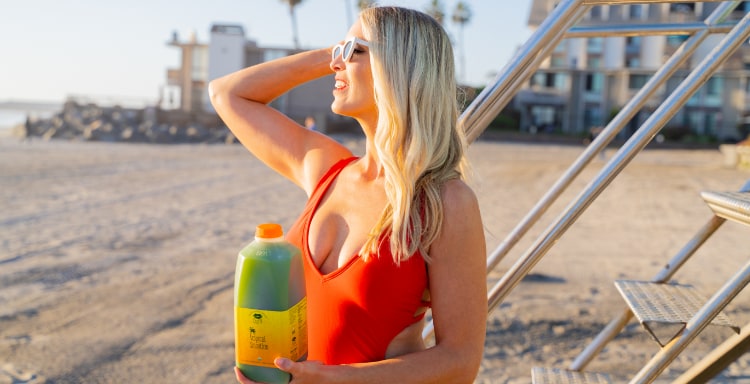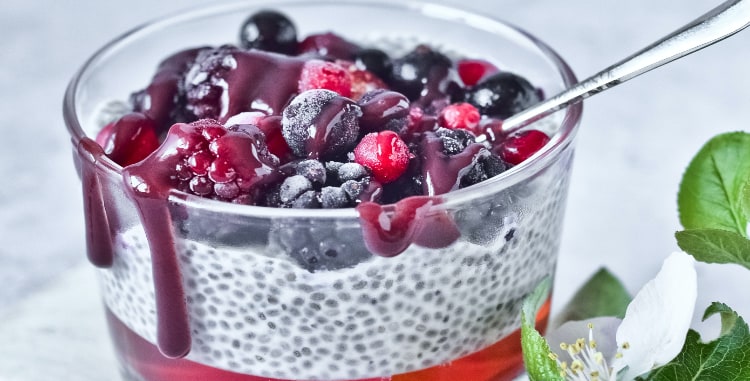
Chia seeds are the less popular sibling of flax seeds. These days, you can’t go down a grocery aisle without seeing flax seed muffins, flax seed waffles, etc. But chia? Try to name one product with chia. Bet you can’t! But here’s why you should consider eating more chia. And, Chef V’s got a killer recipe for chia pudding to share. Yum!
Now I may be dating myself here, but do you remember chia pets? If not, Chia Pets are plants that come in terracotta pots in the shape of figurines like puppies. You simply soak the pet and the chia seeds in water. Within a few days, your new puppy sports a rich coat of chia seed sprouts.
If you’re intrigued, chia seeds isn’t a fly-by-night silly fad like, say, pet rocks. You can still buy them at big box stores.
Before I became a certified nutritional therapist, the only thing I knew about chia was that’s what Chia Pets are made from. Now, as part of my mission to make cleansing easier, I incorporate chia both into my own diet and encourage my followers to do the same.
In a little bit, I’ll share with you an easy recipe for chia pudding, which makes for a healthy dessert. It also makes for a great way to break a fast, (30 minutes after having a Green Drink) if you’re doing intermittent fasting.
Chia: tiny superfood packs a powerful nutritional punch
Chia seeds are tiny superfood heroes. They come in either white or dark brown/black and pack a huge nutritional punch. Rich in calcium, manganese and phosphorus, chia seeds are also high in fiber, protein and healthy omega fatty acids. Because they are neutral-tasting, they are very versatile. So you can add them to nearly any kind of recipe.
But first, let me share with you why chia seeds are the mighty mouse of nutritional heroes.
Chia seeds are high in protein. In fact, up to 25% of chia’ nutritional profile is protein. They are also high in healthy fats. Approximately one-third of chia is dietary fat. Moreover, chia seeds are high in fiber and antioxidants.
You’re probably aware of the fact that omega-3 fatty acids are good for you. Especially if it’s from sources like wild salmon. It turns out that a majority of the fat content comes from omega-3 fatty acid. Because chia seeds are from a plant, the type of omega-3 in them is called “alpha-linolenic acid” or ALA for short. Plant omega-3, or ALA, is not as potent as an anti-inflammatory compound as EPA and DHA. EPA and DHA are the types of omega-3 fatty acids found in salmon and other cold-water oily fish.
Still, it’s important to eat a mostly plant-based diet. And some of the ALA you do eat from chia seeds converts into EPA/DHA. Moreover, according to Tufts University milled chia seeds (as opposed to whole chia) converts better into EPA.
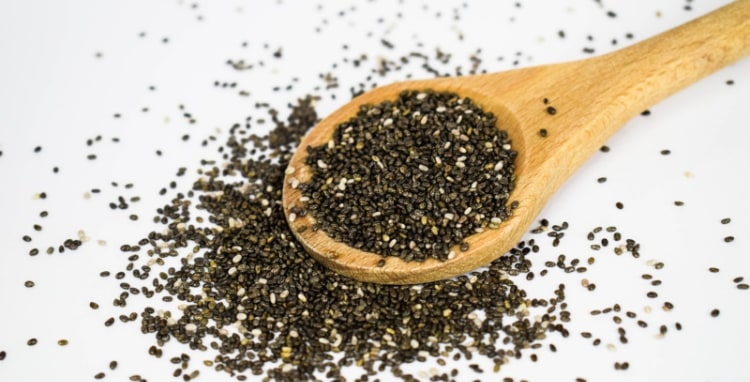
Chia: More Health Benefits
In addition, chia seeds contain another type of fatty acid, omega-6s. On one hand, omega-6 fatty acids are to blame for the high rates of metabolic and inflammatory disease in western society. But this has more to do with the fact that seed oils are used in processed foods and spoil easily when they are cooked. But when you add chia to recipes like the one for my pudding I’m about to share with you, the omega-6s can actually benefit your health.
According to this study, the omega-6’s in chia may actually protect against inflammation. Also, they may also protect against blood clots. Chia seeds, which are naturally gluten-free helps lower fatty deposits in your blood. It also normalizes cholesterol. Consequently, chia lowers blood pressure and reduces the risk of heart disease. These little superfoods that are barely than the period at the end of this sentence protects the liver. And, according to research, they may also protect against diabetes, arthritis, autoimmune disease and cancer. (Unfortunately, few human studies exist proving the health benefits of chia.)
Chia also contains healing compounds. Research proves these compounds act as potent antioxidants. Quercetin is one of them. It has anti-inflammatory abilities. It may also help protect against cancer and blood clotting. Other antioxidants in chia include caffeic acid (coffee is another example of this polyphenol), as well as kaempferol and myricetin. The latter possesses anti-oxidant, anti-cancer, anti-diabetic and anti-inflammatory properties, according to this study.
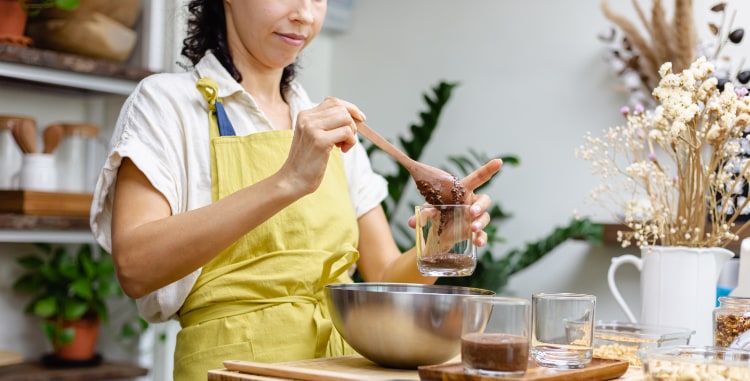
Chia: Better Than Flax?
Chia seeds seem not to enjoy the same commercial success as flax. Products with flax seeds seem to be everywhere in the supermarket. But should chia be stealing more of the spotlight?
Maybe so.
The Tufts article says eggs from hens fed with chia have higher omega-3 content than eggs fed from flax seed (or the seed used to make Canola oil).
Another benefit of chia may be that chia seeds don’t quickly go rancid, like flax seeds are prone to do, says the Tufts University article. (Which is why it’s good practice to refrigerate your flax seeds.)
Speaking of eggs, if you’re vegan, Tufts University says that chia make for a great alternative to eggs in cooking. That’s because their sticky, gel-like coating when soaked in water acts like a bonding agent. Use one tablespoon of chia powder dissolved in a quarter-cup of water as a substitute for one egg, says Tufts.
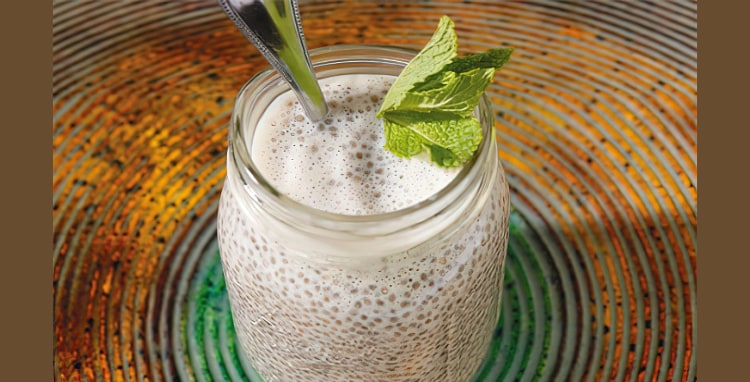
Chef V’s Chia Pudding
Alright, alright, it’s recipe time. Enjoy. I love feedback. Tell me what you think!
Ingredients
- 1 cup chia seeds
- 2½ cups Chef V’s Raw Almond Milk
- 1 tablespoon raw coconut nectar (I like Coconut Secret®)
- 1 teaspoon pure vanilla extract
- ½ teaspoon ground cinnamon
- Optional: pinch of sea salt
- OPTIONAL TOPPINGS: Fresh fruit, dried fruit, shredded unsweetened coconut, raw nuts
Directions
Place all of the ingredients except for toppings in a bowl and stir until well combined. Let the mixture sit for 5 minutes, then stir with a fork. Repeat this process every 5 minutes for about 30 minutes, or until the chia seeds have soaked up all the liquid. Chill pudding for 2 hours before serving. Top with your favorite garnish and dig in.
